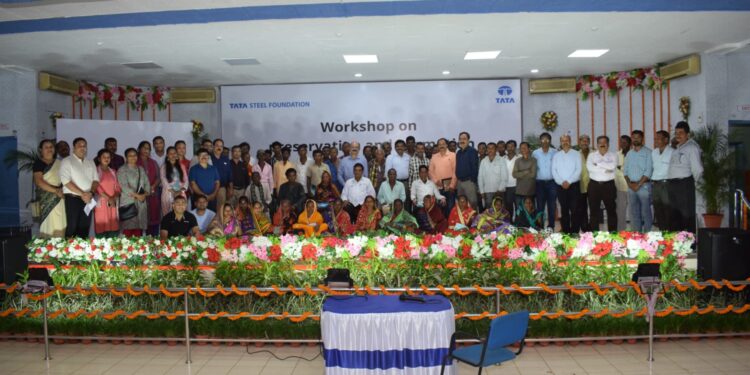- Unique initiative on conservation of species
- Experts and tasar farmers deliberate on way forward to conserve the breed
- Central Silk Board roped in for pilot project on conservation of Sukinda Ecorace in Sukinda, Jajpur district of Odisha
Sukinda: As part of its efforts to contribute to richness of biodiversity of the region, Tata Steel Mining Limited (TSML) in association with its Corporate Social Service Responsibility wing Tata Steel Foundation (TSF) has come forward to conserve Sukinda Ecorace, an indigenous silkworm breed of Sukinda, located in Jajpur district of Odisha.
Senior members of Central Silk Board (CSB), TSML, TSF and other experts deliberated on this subject in a workshop organised at the Sukinda Chromite Mine of TSML in presence of scientists and tasar farmers and prepared a road map for conservation of Sukinda Ecorace, which produces finest silk. Under continuous monitoring by CSB, TSF and TSML, the project will be taken forward and assessment will be made on mainstreaming the same after one year.
Appreciating TSML and TSF for the initiative, Dr. K. Sathyanarayana, Director, Central Tasar Research & Training Institute, Ranchi, who had joined as the Chief Guest on the occasion said, “conservation of this indigenous variety of silkworm Sukinda Ecorace is highly essential to preserve our biodiversity and the bounty of nature for posterity. This will also help increase tasar productivity.”
Elaborating on Tata Steel Mining’s commitment to biodiversity, its Managing Director, Pankaj Satija, said,” we will extend all support to the Central Silk Board for conservation of Sukinda Ecorace in order to contribute to biological diversity of the region and also help the local tasar farmers. This is one of many such initiatives we have been undertaking to create awareness on biodiversity among the community around our operations.”
Since 2007, Tasar Rearers’ Cooperative Society of Sukinda had started rearing Sukinda Ecorace. However, this breed has been slowly vanishing. Another breed – Daba TV has become more dominant now. The natural habitat of superior Sukinda Ecorace breed is Sukinda region where the forest type is tropical moist deciduous, and the soil type is red loamy. Out of eight breeds of silkworms available in Odisha, many farmers in the region depend on ‘tasar’ farming of Sukinda Ecorace for their livelihood.
Also present on today’s workshop were Sushanta Kumar Mishra, Senior General Manager, TSML, Mihir Gajendra Mohapatra, Assistant Director of Sericulture, Dhenkanal ,Dr. Prasanta Kumar Kar, Scientist D, Central Silk Board (CSB), Dr Karmabeer Jena, Scientist-D, CTR&TI, Ranchi, Dr D.I.G Prabhu, Scientist C, CSB, Rajendra Khandai, Integrator, Tasar Development Foundation, Ranchi.














